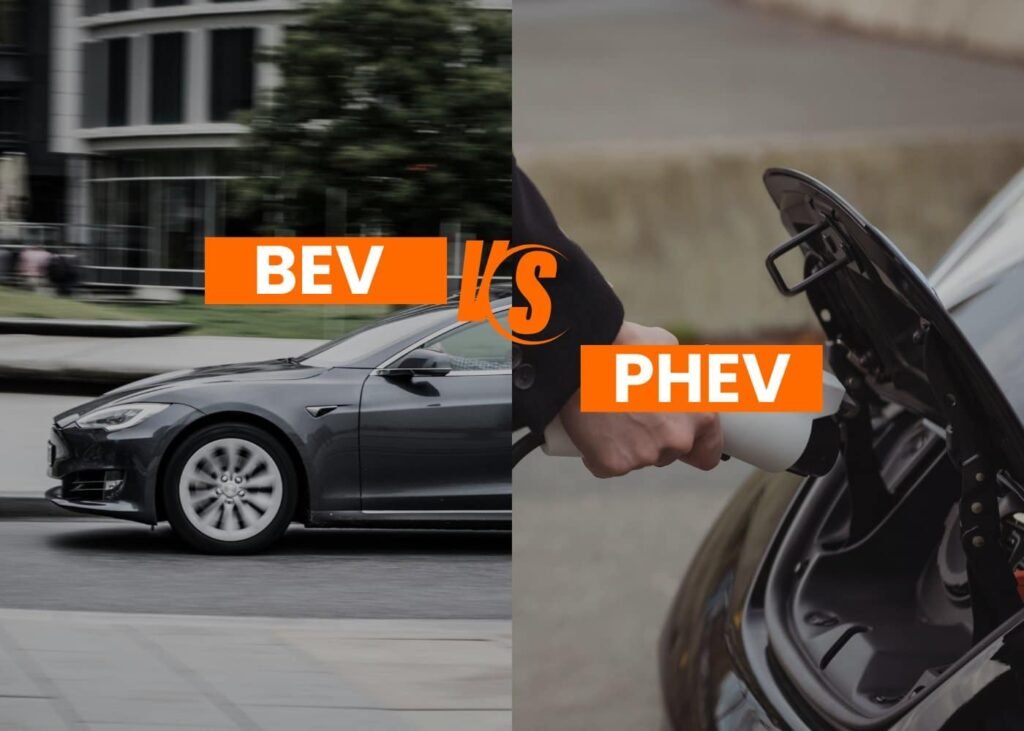Hybrid vs Plug-in Hybrid Comparison 2025: Complete Guide
The Hybrid vs Plug-in Hybrid Comparison 2025 debate is one of the most important decisions facing eco-conscious car buyers in 2025. While both vehicle types combine gasoline engines with electric motors for improved fuel efficiency, the key differences in charging capabilities, electric range, and costs can significantly impact your driving experience and wallet. This comprehensive comparison guide breaks down everything you need to know about regular hybrids (HEV) versus plug-in hybrids (PHEV) to help you make the best choice for your lifestyle and budget.

Understanding the Basics: What Are Hybrids and Plug-in Hybrids?
How Regular Hybrids Work (HEV)
Regular hybrids, also known as self-charging hybrids or HEVs (Hybrid Electric Vehicles), combine a gasoline engine with an electric motor and small battery pack. The system automatically switches between power sources or combines them for optimal efficiency.
Key Features of Regular Hybrids: • Cannot be plugged in to charge externally • Battery charges through regenerative braking and engine operation • Electric motor assists during acceleration and low-speed driving • Typical battery capacity: 1-2 kWh • Electric-only range: 1-2 miles at low speeds
Popular Regular Hybrid Models:
- Toyota Prius (54 MPG combined)
- Honda Accord Hybrid (48 MPG combined)
- Toyota Camry Hybrid (52 MPG combined)
- Nissan Altima (39 MPG combined)

How Plug-in Hybrids Work (PHEV)
Plug-in hybrids feature larger battery packs that can be charged by plugging into an electrical outlet or charging station. They can operate in electric-only mode for significant distances before the gasoline engine activates.
Key Features of Plug-in Hybrids: • Can be plugged in to charge from external power source • Larger battery capacity: 8-18 kWh typically • Electric-only range: 20-50+ miles • Operates as pure electric vehicle until battery depletes • Then functions like a regular hybrid
Popular Plug-in Hybrid Models:
- Toyota Prius Prime (44 miles electric range)
- Honda Clarity PHEV (47 miles electric range)
- Chevrolet Volt (53 miles electric range)
- BMW 330e (22 miles electric range)
Key Technology Differences
Battery Technology:
- HEV: Smaller nickel-metal hydride or lithium-ion batteries (1-2 kWh)
- PHEV: Larger lithium-ion battery packs (8-18 kWh)
Charging Systems:
- HEV: No external charging capability
- PHEV: Level 1 (120V) and Level 2 (240V) charging ports
Electric Motor Power:
- HEV: Electric motor provides assistance, cannot power vehicle alone at highway speeds
- PHEV: Electric motor can independently power vehicle at all speeds
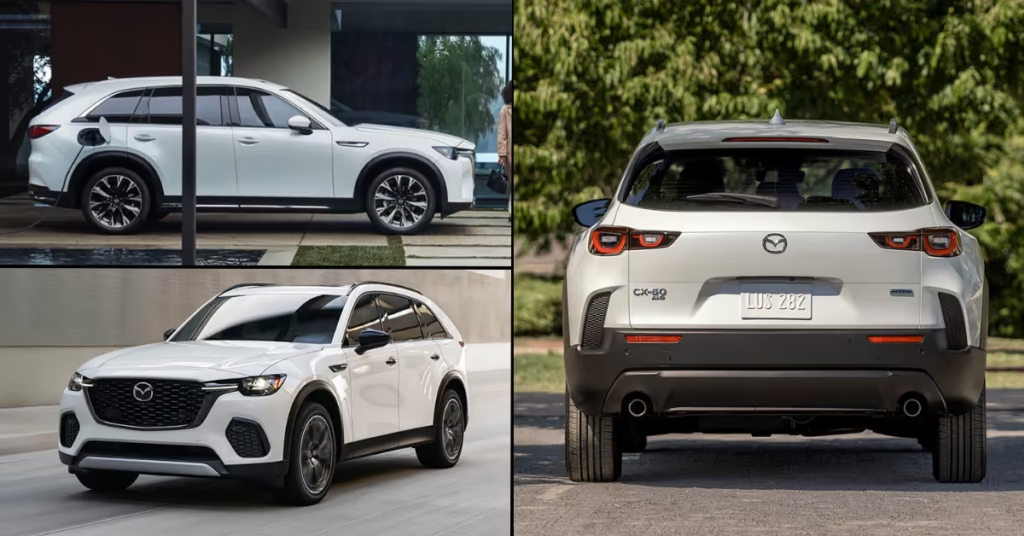
Hybrid vs Plug-in Hybrid: Side-by-Side Comparison
| Feature | Regular Hybrid (HEV) | Plug-in Hybrid (PHEV) |
|---|---|---|
| Purchase Price | $25,000-$35,000 | $28,000-$45,000 |
| Electric Range | 1-2 miles | 20-50+ miles |
| Fuel Economy | 40-54 MPG | 40-50 MPG + electric |
| Charging Required | No | Yes (optional) |
| Tax Credits | None | Up to $7,500 federal |
| Maintenance | Standard hybrid | Standard hybrid |
| Best For | City driving, no charging access | Short commutes, home charging |
Fuel Economy and Efficiency
Regular Hybrid Efficiency: Regular hybrids excel in stop-and-go city driving where regenerative braking is most effective. The Toyota Prius leads with 54 MPG combined, while most hybrids achieve 40-50 MPG.
Plug-in Hybrid Efficiency: PHEVs offer the best of both worlds – electric driving for daily commutes and hybrid operation for longer trips. When operating on electric power alone, PHEVs achieve the equivalent of 100+ MPGe.
Real-World Efficiency Factors: • Driving patterns (city vs. highway) • Climate and temperature effects • Charging frequency for PHEVs • Vehicle age and maintenance
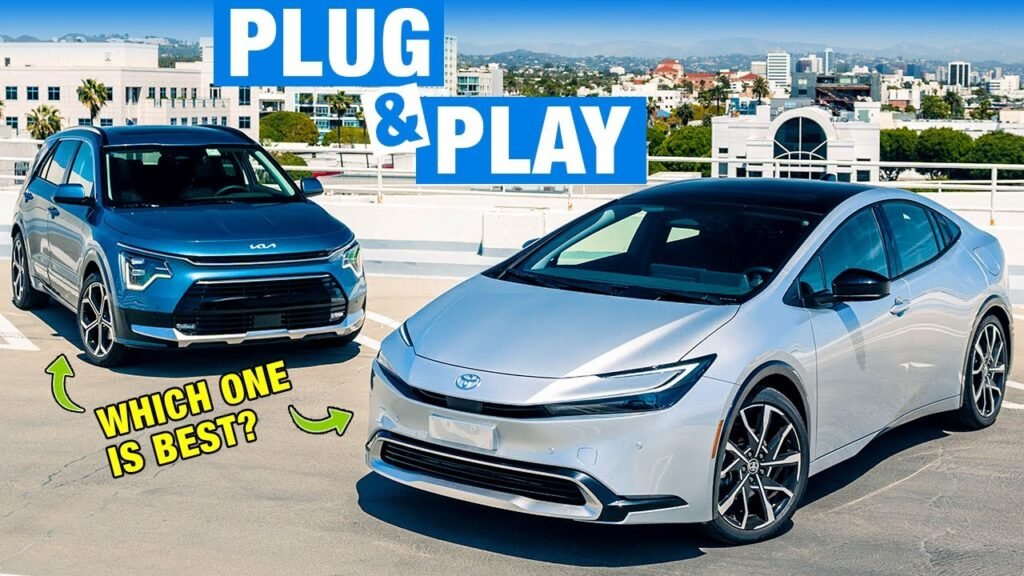
Purchase Price and Incentives
Initial Cost Comparison:
- Regular Hybrids: $3,000-$5,000 premium over conventional vehicles
- Plug-in Hybrids: $6,000-$12,000 premium over conventional vehicles
Federal Tax Credits (2025):
- Regular Hybrids: No federal tax credits available
- Plug-in Hybrids: Up to $7,500 federal tax credit (varies by manufacturer and battery capacity)
State and Local Incentives: Many states offer additional incentives for PHEVs: • California: Up to $2,000 rebate • Colorado: Up to $4,000 tax credit • New York: Up to $2,000 rebate • HOV lane access in many states
Maintenance Costs Over Time
Regular Hybrid Maintenance:
- Annual maintenance: $435-$580
- Brake pads last 80,000+ miles due to regenerative braking
- Battery replacement: $3,000-$4,500 (after 8-10 years)
- Oil changes: Every 10,000 miles
Plug-in Hybrid Maintenance:
- Annual maintenance: $450-$620
- Similar brake longevity benefits
- Larger battery replacement: $5,000-$8,000 (after 8-10 years)
- Additional electrical system complexity
Environmental Impact Analysis
Carbon Footprint Comparison:
- Regular Hybrid: 50-60% reduction in CO2 emissions vs. conventional cars
- Plug-in Hybrid: 60-80% reduction when charged from clean energy sources
Lifecycle Environmental Factors: • Battery manufacturing impact • Electricity source for charging (coal vs. renewable) • Vehicle longevity and recyclability • Reduced petroleum consumption

Electric Range and Charging Requirements
Plug-in Hybrid Electric Range
2025 PHEV Range Leaders:
- Chrysler Pacifica Hybrid: 32 miles
- BMW X5 xDrive45e: 31 miles
- Volvo XC60 Recharge: 35 miles
- Toyota Prius Prime: 44 miles
- Chevrolet Volt: 53 miles (discontinued but available used)
Range Factors: • Temperature effects (cold weather reduces range by 20-40%) • Driving style and speed • Use of heating/air conditioning • Terrain and elevation changes
Charging Infrastructure Needs
Home Charging Setup:
- Level 1 (120V): Standard outlet, 4-8 hours for full charge
- Level 2 (240V): Dedicated charger, 2-4 hours for full charge
- Installation Cost: $500-$2,000 for Level 2 home charger
Public Charging Options: • DC fast charging not available for most PHEVs • Level 2 public chargers widely available • Charging networks: ChargePoint, EVgo, Electrify America
Home Charging Setup Costs
Equipment Costs:
- Level 1 charging cable: Included with vehicle
- Level 2 home charger: $400-$1,200
- Electrical panel upgrade: $1,500-$3,000 (if needed)
- Installation labor: $300-$800
Monthly Electricity Costs: • Average: $25-$50 per month for daily charging • Cost per mile: 3-5 cents (vs. 12-15 cents for gasoline) • Varies by local electricity rates and usage patterns
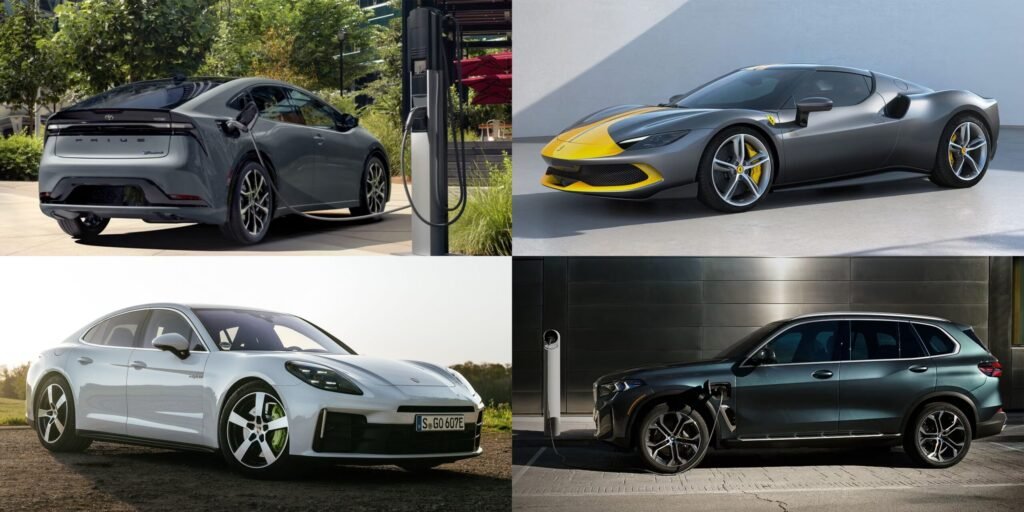
Best Use Cases: Which Type Suits Your Lifestyle?
When Regular Hybrids Make Sense
Ideal Candidates for HEVs: • City drivers with frequent stop-and-go traffic • No access to home charging • Want fuel efficiency without charging complexity • Lower upfront budget • Primarily drive long distances
Driving Patterns Best for Regular Hybrids:
- Daily commute: 15+ miles one way
- Frequent highway driving
- Unpredictable daily mileage
- Limited parking/charging access
Financial Profile:
- Purchase price priority over long-term savings
- Don’t qualify for or need tax credits
- Prefer simplicity over maximum efficiency
When Plug-in Hybrids Are Better
Ideal Candidates for PHEVs: • Short daily commutes (under 40 miles) • Access to home or workplace charging • Want maximum fuel savings • Qualify for tax credits and incentives • Environmentally conscious
Driving Patterns Best for Plug-in Hybrids:
- Daily commute: 10-40 miles round trip
- Predictable daily driving routine
- Occasional longer trips
- Home garage or dedicated parking
Financial Profile:
- Can utilize tax credits effectively
- Focus on long-term operating savings
- Willing to invest in charging infrastructure
Driving Pattern Analysis
Calculate Your Potential Savings:
Example Scenario 1: City Commuter
- Daily driving: 25 miles
- Regular Hybrid: $1,200/year in fuel
- Plug-in Hybrid: $600/year in electricity + gas
- Annual savings: $600 with PHEV
Example Scenario 2: Highway Commuter
- Daily driving: 60 miles
- Regular Hybrid: $1,800/year in fuel
- Plug-in Hybrid: $1,400/year (mixed electric/gas)
- Annual savings: $400 with PHEV
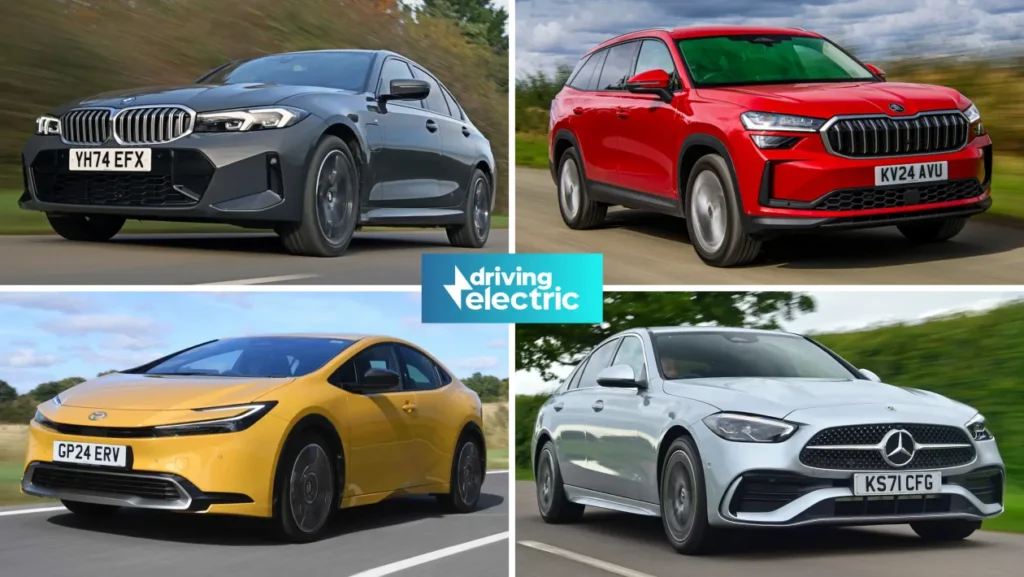
Popular Models Comparison 2025
Top Regular Hybrid Models
Toyota Prius
- Price: $27,450
- MPG: 54 combined
- Reliability: Excellent
- Best for: Maximum fuel economy
Honda Accord Hybrid
- Price: $33,295
- MPG: 48 combined
- Interior: Spacious sedan
- Best for: Family transportation
Toyota Camry Hybrid
- Price: $32,620
- MPG: 52 combined
- Performance: 208 HP
- Best for: Sport-oriented drivers
Best Plug-in Hybrid Options
Toyota Prius Prime
- Price: $32,750
- Electric range: 44 miles
- MPG: 54 combined
- Tax credit: $4,502
Honda Clarity PHEV
- Price: $33,400
- Electric range: 47 miles
- Interior: Spacious cabin
- Tax credit: $7,500
BMW 330e
- Price: $45,545
- Electric range: 22 miles
- Performance: Luxury sport sedan
- Tax credit: $5,836
Price and Feature Comparison
Entry-Level Options:
- HEV: Toyota Corolla Hybrid ($24,990)
- PHEV: Toyota Prius Prime ($32,750)
- Price Difference: $7,760 (before tax credits)
Mid-Range Options:
- HEV: Honda Accord Hybrid ($33,295)
- PHEV: Honda Clarity PHEV ($33,400)
- Price Difference: $105 (PHEV qualifies for $7,500 credit)
Luxury Options:
- HEV: Lexus ES 300h ($42,490)
- PHEV: BMW 330e ($45,545)
- Price Difference: $3,055 (before $5,836 PHEV credit)
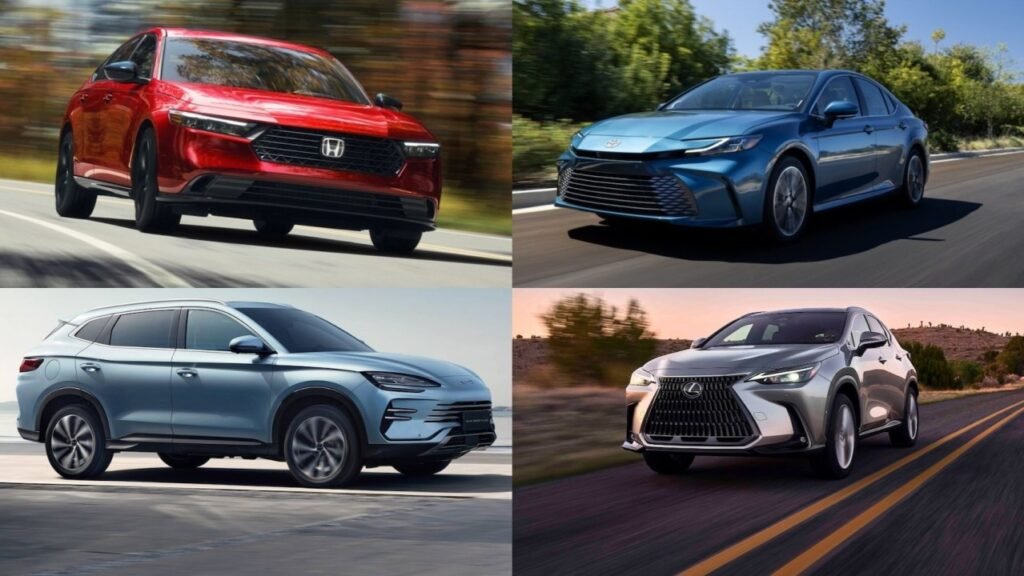
Total Cost of Ownership Analysis
5-Year Cost Breakdown
Regular Hybrid (Toyota Prius Example):
- Purchase price: $27,450
- Fuel costs (75,000 miles): $4,500
- Maintenance: $2,175
- Insurance: $6,000
- Total 5-Year Cost: $40,125
Plug-in Hybrid (Prius Prime Example):
- Purchase price: $32,750
- Federal tax credit: -$4,502
- Fuel/electricity (75,000 miles): $2,800
- Maintenance: $2,310
- Insurance: $6,300
- Home charger installation: $800
- Total 5-Year Cost: $39,458
Tax Credits and Incentives
Federal Tax Credit Eligibility (2025): The federal tax credit phases out after manufacturers sell 200,000 qualifying vehicles:
- Tesla: No longer eligible
- GM: No longer eligible
- Toyota: $4,502 for Prius Prime
- Honda: $7,500 for Clarity PHEV
- BMW: $5,836 for 330e
State Incentive Examples:
- California: $2,000 rebate + potential utility rebates
- Colorado: Up to $4,000 tax credit
- Connecticut: $3,000 rebate
- New York: Up to $2,000 rebate
Resale Value Considerations
Hybrid Resale Values: Regular hybrids, particularly Toyota models, maintain strong resale values:
- Toyota Prius: 60-65% of original value after 3 years
- Honda Accord Hybrid: 58-62% retention
- Market demand remains strong for proven models
Plug-in Hybrid Resale Factors:
- Battery degradation concerns affect resale
- Technology advancement makes older models less desirable
- Tax credit availability affects new vs. used pricing
- Average retention: 50-58% after 3 years
Factors Affecting Resale: • Battery warranty remaining • Charging infrastructure growth • Gasoline price trends • Environmental regulations

Making Your Decision: Hybrid vs Plug-in Hybrid
Decision Framework
Choose a Regular Hybrid If: ✓ Your daily driving exceeds 50 miles ✓ You don’t have reliable charging access ✓ You prioritize lower upfront costs ✓ You want proven, simple technology ✓ You frequently take long road trips
Choose a Plug-in Hybrid If: ✓ Your daily commute is under 40 miles ✓ You have home charging capability ✓ You qualify for tax credits ✓ You want maximum fuel savings ✓ Environmental impact is a priority
Final Recommendations
Best Overall Regular Hybrid: Toyota Prius
- Proven reliability, best-in-class efficiency, strong resale value
Best Overall Plug-in Hybrid: Toyota Prius Prime
- Excellent electric range, Toyota reliability, significant tax credit
Best Value Plug-in Hybrid: Honda Clarity PHEV
- Spacious interior, maximum federal tax credit, competitive pricing
Best Luxury PHEV: BMW 330e
- Premium features, sporty performance, respectable electric range
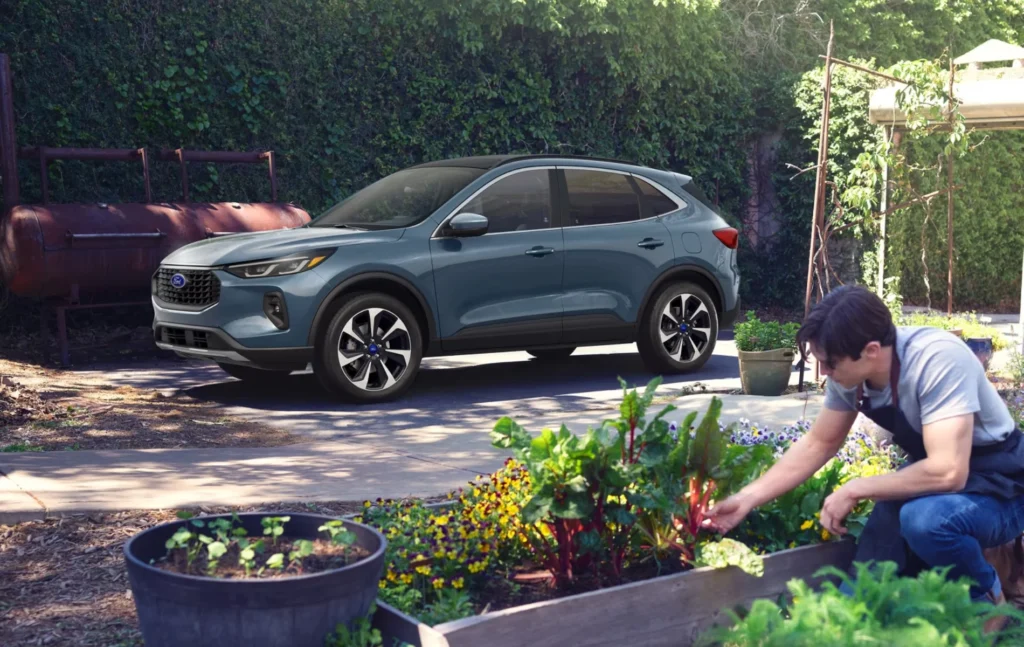
Frequently Asked Questions
Q: Can you drive a plug-in hybrid without charging it? A: Yes, plug-in hybrids operate like regular hybrids when the battery is depleted, but you’ll miss out on the fuel savings and environmental benefits.
Q: How long do hybrid batteries last? A: Most hybrid batteries last 8-15 years or 100,000-200,000 miles. Plug-in hybrid batteries may need replacement slightly sooner due to more frequent charging cycles.
Q: Are plug-in hybrids worth the extra cost? A: For drivers with short commutes and home charging, PHEVs can save $500-$1,000 annually in fuel costs, plus qualify for substantial tax credits.
Q: Do hybrid cars need special maintenance? A: Hybrid maintenance is similar to conventional cars, with some advantages like longer-lasting brake pads and extended oil change intervals.
Conclusion
The choice between hybrid and plug-in hybrid ultimately depends on your driving patterns, charging access, and financial priorities. Regular hybrids offer simplicity and proven fuel efficiency for all driving conditions, while plug-in hybrids provide maximum savings and environmental benefits for drivers with shorter commutes and charging access.
Consider your daily mileage, charging infrastructure, available incentives, and long-term ownership costs when making your decision. Both technologies offer significant advantages over conventional vehicles and represent important steps toward more sustainable transportation.
For more detailed information about top-rated hybrid vehicles or current EV incentives, explore our comprehensive automotive guides. If you’re considering a plug-in hybrid, don’t miss our home charging installation guide.

